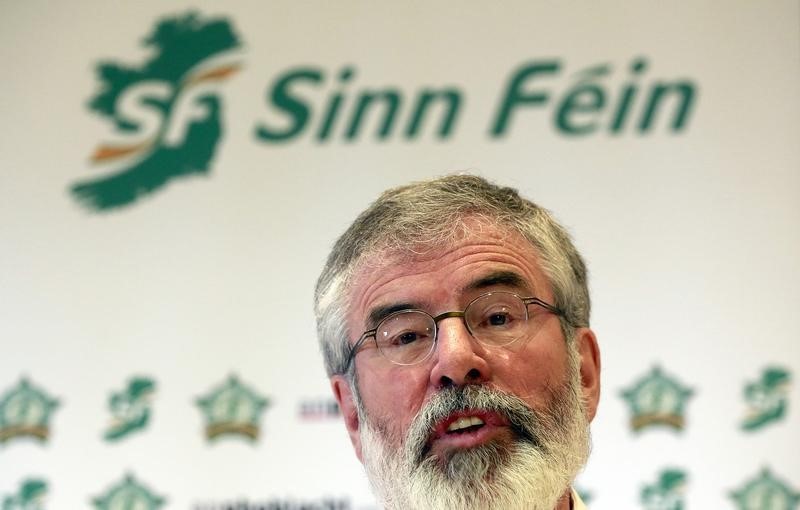By Padraic Halpin and Conor Humphries
DUBLIN (Reuters) - Sinn Fein's hopes of becoming the latest European anti-austerity party to break into power will be tested in the coming weeks as it struggles to save Northern Ireland's power-sharing government from collapse.
The former political wing of the Irish Republican Army (IRA) has been part of Belfast's compulsory coalition for years but is seeking a major breakthrough in elections in the larger Irish republic to the south, where its popularity surged during the country's financial crisis.
A close ally of Greece's Syriza, which won re-election on Sunday, Sinn Fein's dogged opposition to austerity has lifted its support in the republic to an average of around 20 percent in opinion polls this year, from 10 percent in the 2011 election.
However its appeal south of the border is waning just as the power-sharing coalition in Northern Ireland created under a 1998 peace deal teeters over a murder linked to former members of the IRA and disagreement over budget cuts.
Both issues play into their southern opponents' hands.
One poll suggested Sinn Fein had lost a third of its support since briefly overtaking Prime Minister Enda Kenny's Fine Gael party in December. The northern crisis has fuelled attacks that Sinn Fein would wreck the political stability that has fostered an economic recovery in the south that is the envy of Europe.
"Sinn Fein are incapable of running a government," Finance Minister Michael Noonan of Fine Gael told the Irish Times newspaper last week, days after data showed the economy grew by 7 percent in the first half of the year.
"If they can't handle a budget with a couple of hundred million around social welfare (in Northern Ireland), how are they going to handle a national budget down here with all the things we have to do and decisions we have to make every year?"
Finding agreement in the talks over social welfare cuts long demanded by Northern Ireland's British paymasters presents the trickiest challenge to Sinn Fein and its anti-austerity platform.
DOWNWARD TREND
Alternatively, salvaging a deal could be a boost, bolstering the image cultivated by Sinn Fein's Gerry Adams and Martin McGuinness as international statesmen during meetings with U.S. presidents and British royals.
Last week, Adams stood next to the British Ambassador to Ireland to call for a reconciliation process in the north and accused rivals of concentrating on short-term political gain.
Adams' deputy Mary Lou McDonald, speaking to Reuters on the sidelines of the event, criticised opponents for seizing on the murder in the north to attack Sinn Fein.
"It seems to me that they (the Irish government) were quite prepared to throw the peace process under the bus for the sake of a few percentage points in an opinion poll," she said.
"That is a disgraceful approach."
With Kenny due to call elections by next April, Sinn Fein needs to settle matters in the north to draw voters' attention to what they see as an uneven recovery hamstrung by the years of austerity.
"Sinn Fein has been on a downward trend since the start of this year and a recovering economy will make it very difficult for people who have focussed on anti-austerity policies," said Theresa Reidy, a politics lecturer at University College Cork.

"Unless they can regain a really strong foothold in that debate and offer an alternative that's credible, I think their plateauing will continue."